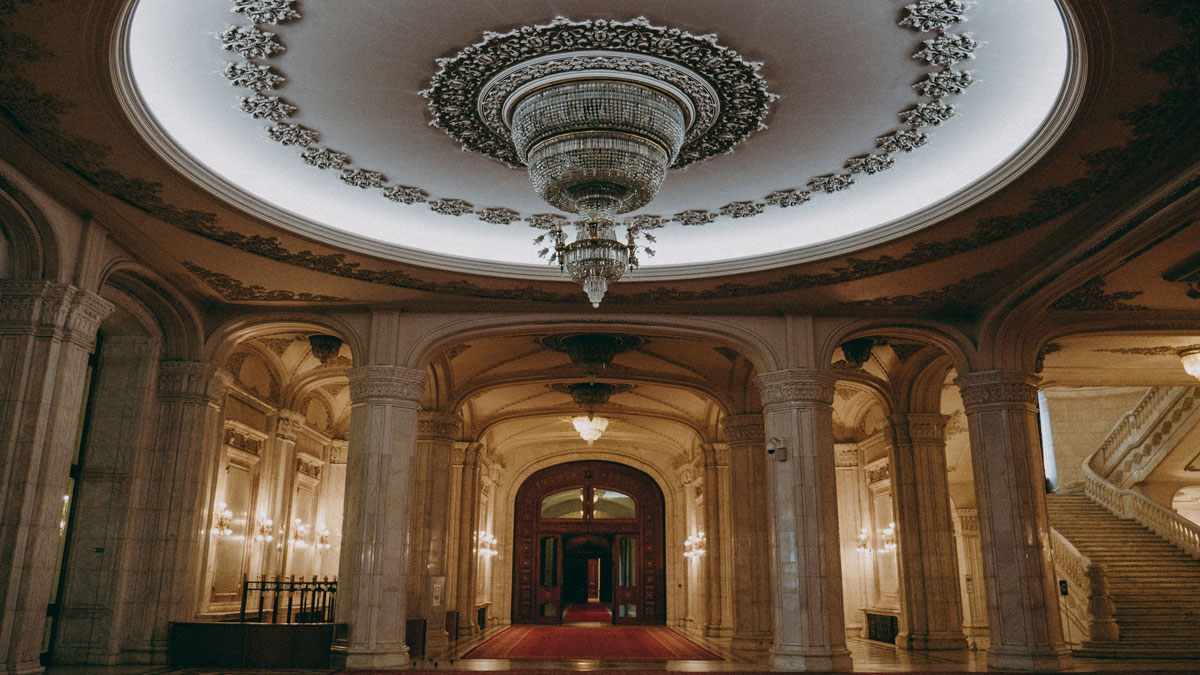The Palace of the Parliament in the Romanian capital of Bucharest is a monument to fear.
The building, began under dictator Nicolae Ceausescu, was not finished until after the dictator was taken out in the 1989 Christmas Revolution.
It is the second largest building behind the Pentagon and the heaviest building in the world. Made of marble, it is incredibly heavy. So much so that our guide told us that it is sinking at a rate of 6 millimetres a year. There are estimated to be 15,000 chandeliers in the building and to run all the lights and power to systems in the building would take as much as a quarter of the power needs of Bucharest. There are 10 storeys above ground and at least three below.
Another interesting feature he pointed out, were the ventilation panels in the ceilings. Ceausescu demanded that there was no air-conditioning system installed as he was afraid it would be used to poison him. His paranoia didn’t end there. One room was designed to have a retractable glass roof so he could land his helicopter.
Dictators are notoriously paranoid, and Ceausescu was no exception.

Tunnels are rumoured to stretch out underneath the building in all directions.
The building now has air-conditioning. It never got its retractable roof as the building was finished more cheaply than it was started, the exorbitant costs of the original design one of the reasons for the start of the revolution.
The world we live in is gripped by fear. With war zones in Europe and the Middle East and a terror attack in Belgium, there is a growing feeling of uncertainty, discomfort and stress. Even in the relatively distant South Pacific, we are still affected by the news cycle.
The problem with fear is that it leads to paranoia. It causes us to distrust others, shut ourselves off from life experiences, pull back from relationships and often even protect ourselves at the cost of others. Fear harnessed by politicians and leaders is a powerful force to get people to do what they ordinarily would never do. It can cause us to betray our morals and the stranger in our midst for the illusion of safety.
Fear is not the animating principle that Christians should use to convert others or be cowed by.
Thankfully the Bible provides an antidote. Love. John tells us, “There is no fear in love. But perfect love drives out fear, because fear has to do with punishment. The one who fears is not made perfect in love” (1 John 4:18).
The Message paraphrase puts it this way: “There is no room in love for fear. Well-formed love banishes fear.”
In a world gripped by fear and isolationist tendencies, Christians have the opportunity to swim against the current. Could we once again be known for our love? In a time of scarcity and living pressure, could our love be shown as generosity to those who are less fortunate?
As certain groups of people are made out as our enemies, will we have the courage to love them, as Jesus called us to do?
We have a hope in a world greater than this one, but we should not ignore the current problems. We should look to solve them with love.
We can be countercultural and revolutionary once again. As love fades from public discourse and everyone around us is picking sides, we have the chance to choose a different path.
We have the opportunity to love the ones we are close to. But also to show kindness to those we don’t know. Let’s commit to make every day a better experience for someone. A simple smile can go a long way.
I’m talking to myself here. The past few years have made us all withdraw in some ways into ourselves. It’s time to be more open, inviting and loving. God’s love is the only thing that can save the world. And He invites us to join Him in loving that world. Will we answer that call?






